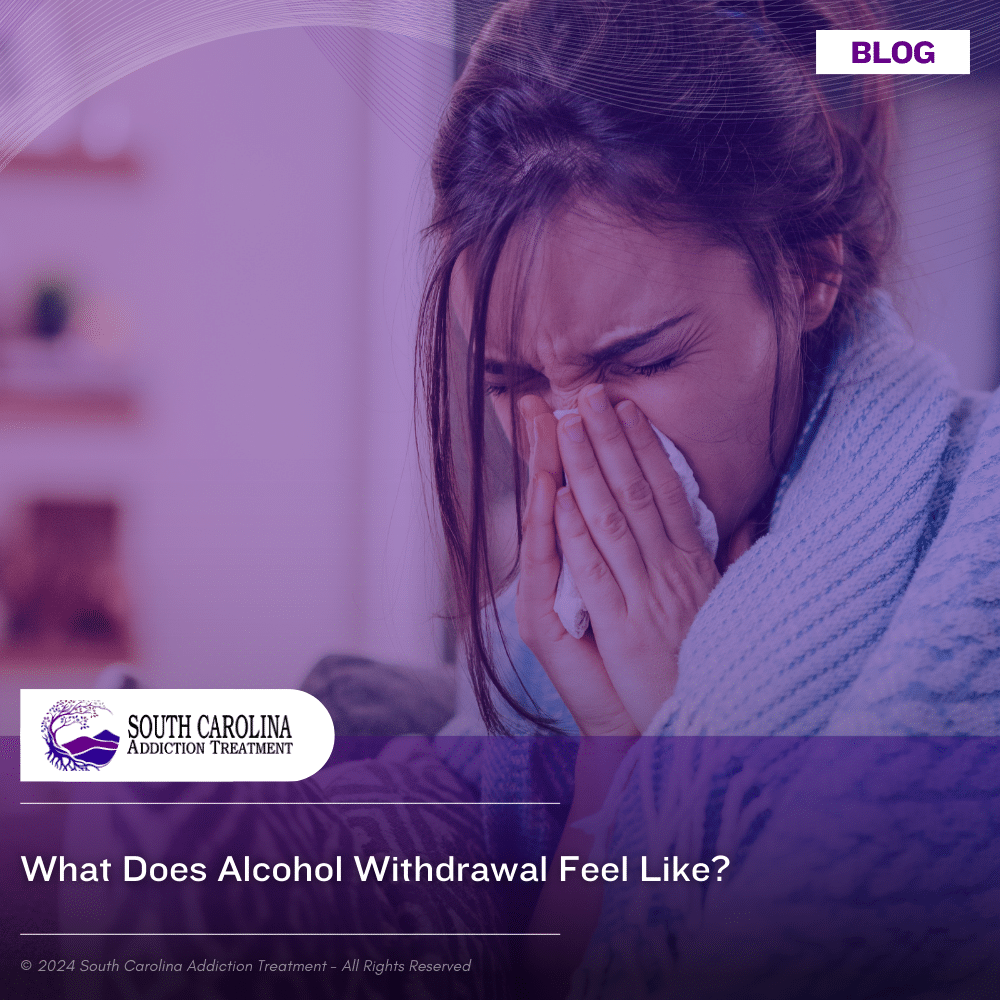What Does Alcohol Withdrawal Feel Like?

Medically Verified: 2/1/24
Medical Reviewer
Chief Editor

All of the information on this page has been reviewed and verified by a certified addiction professional.
Many people have unhealthy relationships with alcohol. Someone might start drinking socially and become dependent on it. Some may rely on alcohol to relieve physical pain or emotions like sadness, loneliness, or anxiety. Over time, someone might start to drink more than before–and more than they ever intended to. Alcohol dependence or addiction is almost certain to happen after weeks, months, or years of heavy drinking. Alcoholism is a complex condition, and many people require comprehensive treatment to overcome it.
When you drink heavily or for a prolonged period, your body becomes dependent on alcohol. If you suddenly stop drinking, you may experience withdrawal symptoms as your body adjusts to the absence of alcohol. Some of these symptoms are uncomfortable, but some can be dangerous or even life-threatening.
Understanding the alcohol withdrawal timeline can help you prepare for the process. For support during alcohol withdrawal, contact the South Carolina Addiction treatment specialists today.
Following the Alcohol Withdrawal Timeline
While many factors can affect your experience in alcohol withdrawal, your symptoms are likely to follow this timeline.
Stage 1: 6-12 hours after your last drink
This stage is marked mainly by uncomfortable physical symptoms, including:
- Anxiety
- Sweating
- Headache
- Insomnia
- Tremors/shaking
- Nausea, vomiting, and abdominal cramps
Intense cravings are common during this stage and can lead to early relapse without treatment.
Stage 2: 12-24 hours after your last drink
Long periods of sweating and vomiting may leave you dehydrated, but you may be unable to eat or drink sufficiently. Some people experience hallucinations that can cause anxiety or interrupted sleep. The risk for alcohol relapse is exceptionally high during this time.
Stage 3: 24-48 hours after your last drink
Dangerous symptoms will most likely occur on the second and third day after your last drink. Irritability and mood swings are common. Low blood sugar can happen during this time. In some rare cases, people develop a life-threatening condition called Delirium Tremens. This condition is marked by extreme confusion, overheating, excessive sweating, hallucinations, seizures, and sometimes, death. Without medical treatment, symptoms during this phase of withdrawal can become life-threatening.
Stage 4: 48-168 hours after your last drink
After two full days without alcohol, your physical symptoms may decrease. Many people experience depression, anxiety, confusion, anger, restlessness, cravings, or other emotional symptoms at this stage.
What Factors Can Affect Your Symptoms of Alcohol Withdrawal?
The length of time you spend in each withdrawal stage and the symptoms you experience may vary significantly from other people. Some things can affect your experience in withdrawal, including:
- Other substances you used – If you were using drugs while drinking, you would likely go through withdrawal from both substances. Your symptoms may be different or more severe than alcohol withdrawal alone.
- Gender – Men typically have longer and more intense periods of withdrawal because of the way their bodies metabolize alcohol. Men also tend to wait longer before seeking treatment, which can lengthen their withdrawal symptoms.
- Family history of alcohol abuse – Having parents or other close family members with a history of alcohol abuse makes it more likely that your withdrawal will be longer or more severe.
- Length of time abusing alcohol – The longer you use alcohol, the longer and more intense your withdrawal is likely to be.
- Amount of alcohol consumed – The amount of alcohol you used to drink can affect the length and severity of your withdrawal.
- Physical or mental health conditions – Your withdrawal may be longer or more intense if you have specific physical conditions or a mental illness.
There is no reliable way to predict how long your alcohol withdrawal will last or how severe your symptoms might be. It is crucial to have medical supervision when you withdraw from alcohol to keep yourself safe and comfortable during the process and to ensure you can complete detox before beginning a comprehensive treatment program.
Treatment During Each Stage of Alcohol Withdrawal
During medically supervised detox, you will be given the support and treatment you need to go through the withdrawal period safely. There are three stages involved in alcohol detox.
Evaluation
Before starting treatment, medical or addiction specialists will assess your needs to determine the correct level of care and type of treatment you require. This evaluation will include questions about your mental and physical health, substance abuse, and treatment history.
Stabilization
During this stage, medical and support staff will monitor your withdrawal symptoms. Medications, therapies, and comfort measures will keep you safe and comfortable during detox. The support you receive will ensure that you have a safe, complete detox from alcohol.
Rehabilitation
Alcohol abuse treatment plans utilize a combination of evidence-based and holistic therapies that address addiction’s physical, emotional, and behavioral roots. Treatment plans generally include education, individual and group therapy, medications, and holistic therapies to support healing, and can be tailored to meet each person’s unique needs.
The goal of detox and alcohol abuse treatment programs is to give you the support and skills you need to overcome addiction and live a healthy, fulfilling life.
Get Help Now
You do not have to manage alcohol withdrawal alone. South Carolina Addiction Treatment is a state-licensed and CARF (commission on accreditation of rehabilitation facilities) accredited substance abuse treatment facility. Reach out to our team of addiction specialists today for help with alcohol detox and treatment.

